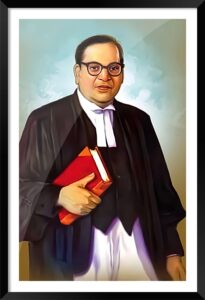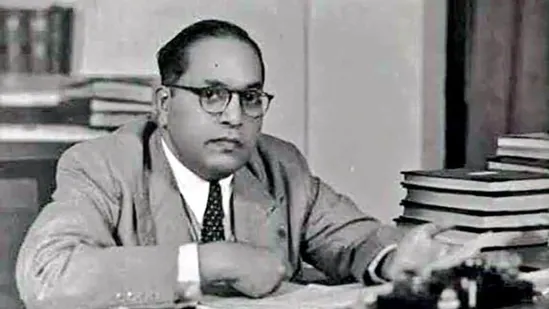Dr. Bhimrao Ambedkar, affectionately known as Dr. Babasaheb Ambedkar, was a visionary leader, social reformer, and the principal architect of the Indian Constitution. He was born on April 14, 1891, in the town of Mhow in present-day Madhya Pradesh, India. Ambedkar’s life was marked by relentless pursuit of social justice and equality for all, full of sacrifice, especially the marginalized and oppressed.
Early Life and Education
Ambedkar’s formal education began in Satara, Maharashtra. Despite facing discrimination from teachers and classmates, he excelled academically. After his family moved to Bombay (now Mumbai), he attended Elphinstone High School, becoming the first untouchable student to be admitted to the prestigious institution. His academic success continued, and in 1907, he became the first from his caste to complete high school, a significant milestone celebrated by his community.
In 1908, Ambedkar enrolled at Elphinstone College, Bombay University, where he earned his Bachelor’s degree in Economics and Political Science in 1912. His academic prowess earned him a scholarship from the Maharaja of Baroda, which enabled him to pursue further studies abroad.
Higher Education in the United States
Ambedkar’s quest for higher education took him to Columbia University in New York City in 1913. Here, he completed a Master’s degree in Economics in 1915, with his thesis titled “Ancient Indian Commerce.” His time at Columbia exposed him to various liberal ideas and social justice movements, significantly shaping his future activism. In 1916, he earned a Ph.D. in Economics for his groundbreaking dissertation, “The Evolution of Provincial Finance in British India.” Columbia University honored him as a “great alumnus” and “the most illustrious son of Columbia.”
Further Studies in the United Kingdom
After his studies in the United States, Ambedkar went to the United Kingdom in 1916 to continue his academic pursuits. He enrolled at the London School of Economics (LSE) and simultaneously joined Gray’s Inn to study law. Financial constraints forced him to return to India in 1917 before completing his studies. However, with the support of the Maharaja of Baroda, he returned to London in 1920.
Ambedkar earned a D.Sc. in Economics from LSE in 1923 for his thesis “The Problem of the Rupee: Its Origin and Its Solution.” He also completed his law studies, becoming a Barrister-at-Law in 1923. This combination of advanced degrees in economics and law equipped Ambedkar with a unique perspective and expertise, which he utilized in his multifaceted career as a social reformer, economist, and legal scholar.
Academic and Professional Achievements

Dr. Ambedkar’s extensive education laid the foundation for his significant contributions to Indian society. As a professor, he taught political economy at the Sydenham College of Commerce and Economics in Mumbai. His scholarly work, combined with his activism, positioned him as a leading intellectual of his time.
Ambedkar’s academic achievements were not just personal milestones; they symbolized the potential for marginalized individuals to overcome systemic barriers through education. His scholarly works, including “The Annihilation of Caste” and “Who Were the Shudras?” reflect his deep engagement with socio-economic issues and his commitment to social justice.
Fighting for Social Justice
Upon his return to India, Ambedkar dedicated himself to challenging the caste system and advocating for the rights of the untouchables, whom he termed Dalits, meaning “the broken.” He founded the Bahishkrit Hitakarini Sabha in 1924 to promote education and socio-economic improvement among Dalits. Ambedkar’s leadership in the Dalit movement was marked by his insistence on self-respect, education, and political empowerment.
In 1930, Ambedkar led the Mahad Satyagraha to assert the right of untouchables to draw water from public tanks. His efforts culminated in the historic Poona Pact of 1932, a significant step toward political representation for Dalits. Ambedkar’s relentless advocacy led to the establishment of reserved seats for untouchables in legislative councils.
Architect of the Indian Constitution
Ambedkar’s most enduring legacy is his pivotal role in drafting the Indian Constitution. As the Chairman of the Drafting Committee, he meticulously crafted a document that enshrined the principles of justice, liberty, equality, and fraternity. His profound understanding of law and deep commitment to social justice ensured that the Constitution provided a framework for an inclusive and democratic society.
Ambedkar’s contributions went beyond legal provisions; he emphasized the need for economic and social democracy. His advocacy for universal adult franchise, abolition of untouchability, and equal rights for women showcased his vision for a progressive and egalitarian India.
Later Life and Legacy
Despite his monumental contributions, Ambedkar faced continued opposition and discrimination. Disillusioned with the slow pace of social reform, he embraced Buddhism in 1956, seeking a path that resonated with his ideals of equality and compassion. He led a mass conversion of Dalits to Buddhism, marking a significant moment in the Dalit movement.
Dr. Babasaheb Ambedkar passed away on December 6, 1956, but his legacy endures. He remains an iconic figure, revered for his unwavering commitment to social justice and his transformative impact on Indian society. Ambedkar’s writings, speeches, and actions continue to inspire movements for equality and human rights globally.
Conclusion
Dr. Babasaheb Ambedkar’s life is a testament to the power of education, perseverance, and vision in overcoming systemic oppression. His relentless pursuit of justice and equality laid the foundation for a more inclusive India. As we reflect on his life, we are reminded of the enduring struggle for social justice and the importance of safeguarding the principles of democracy and equality in our societies.
